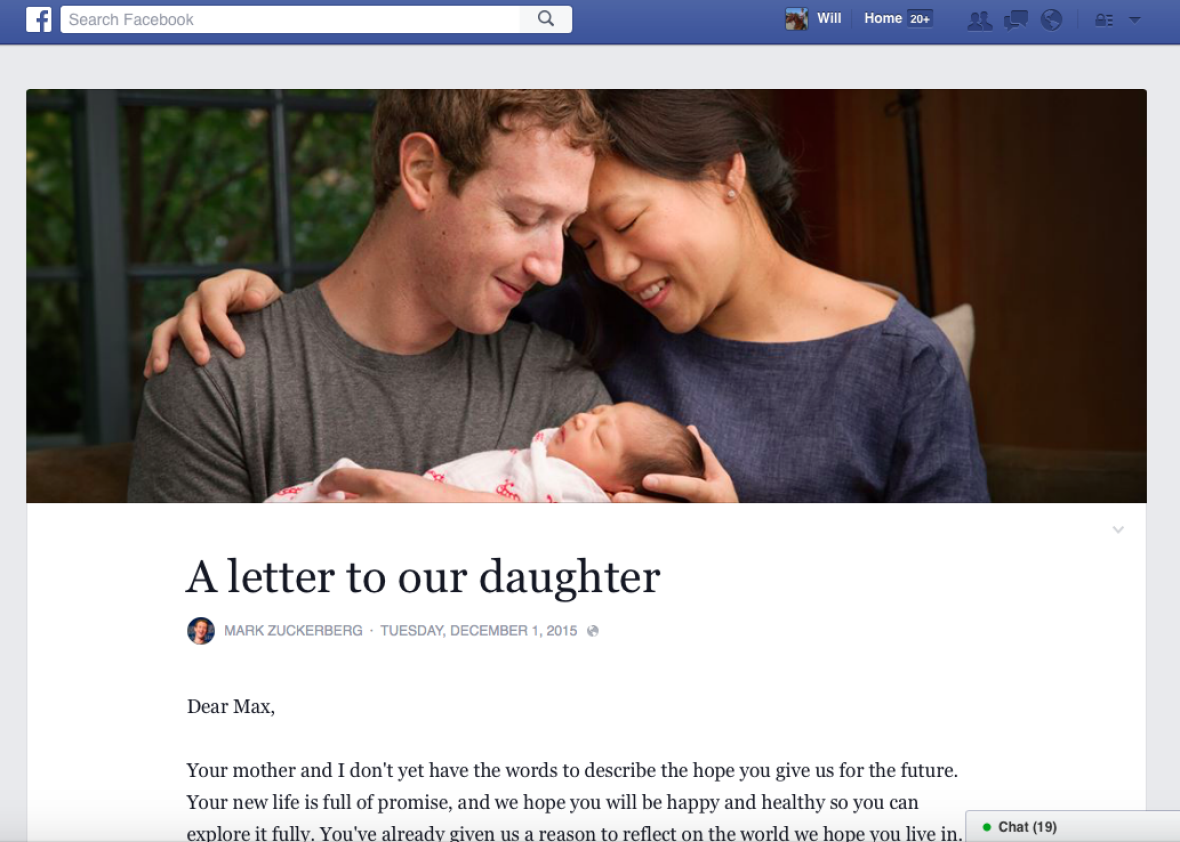Mark Zuckerberg had a baby!
I punctuate the announcement with an exclamation mark, not because it is particularly surprising—he and his wife, Priscilla Chan, announced that they were expecting in July—but because that is the way it will be read, liked, and shared on the social network he built.
“Priscilla and I are so happy to welcome our daughter Max into this world!” the Facebook CEO wrote on his Facebook page. He announced the baby’s arrival with a lengthy letter to her, which he posted using Facebook’s newly revamped Notes feature. (He announced in the same letter that he is giving most of his fortune to charity.)
You might wonder why I’m writing about Zuckerberg’s baby announcement on a technology blog. Yes, Zuckerberg runs an influential technology company. But so do a lot of other people whose baby announcements have rated no mention in this space. Somehow Zuckerberg’s baby news feels more like, well, news.
That isn’t only because the Facebook chief announced that he’ll take two months of paternity leave, which sadly qualifies as a radical political statement in our gender-biased, productivity-obsessed culture. (Yahoo honcho Marissa Mayer’s baby made headlines for its parental-leave implications, too.) It’s because his social network has redefined what qualifies as news and has reshaped how it is transmitted.
The media used to draw clear lines between news, opinion, gossip, and personal announcements. Each had its own section in the morning paper. Facebook’s News Feed, which has emerged as a news source for an amazing 40 percent of U.S. adults, makes no such distinctions. Your friend’s engagement announcement, your uncle’s political rant, and an article about the latest developments in Syria jostle for the same space on your screen. And it turns out that, for a lot of us, the Syria news feels the least urgent of the three. So Facebook’s algorithms, ever attuned to our behavior, downgrade it in favor of more personal posts from our friends.
Facebook thus encourages us to broadcast our intimate life changes to everyone we know, complete with catchy headlines to maximize the amount of affirmation we receive in return. Zuckerberg, though he values his privacy more than he lets on, has made an effort to exemplify this principle. Through his massively popular personal Facebook feed, which is followed by 42.5 million people, he has let the world know about the major events in his life, including his marriage to Priscilla Chan and the exploits of their dog Beast, who has his own Facebook page with 2.2 million likes.
The result is that we know Zuckerberg, or at least feel like we do, in a way that we don’t know other tech executives (the living ones, anyway). Did you know that Bill Gates has three kids? Just try naming them without resorting to Bing.
Zuck, Cilla, and Beast may not be celebrities on the order of the Obamas or the Kimyes or the Carter-Knowles, and their baby may not get the full royal tabloid treatment. But Facebook is a medium that shapes the message, and within the context of the social network, a Zuckerberg baby photo is stop-the-presses material.
Perhaps that’s as it should be. After all, you may or may not care about Zuckerberg’s baby as much as you care about the GOP presidential race or the Paris climate talks or Black Lives Matter. But there are probably other babies whose births would merit top billing in your personal news feed, including your own. You won’t see them on CNN, hear about them on NPR, or read about them on Slate. But you will see their tiny faces when you tap the Facebook app, along with all your friends’ delighted reactions.
That Zuckerberg is using his life event as an opportunity to promote a major professional announcement only goes to show that he’s forced to play by the same rules of engagement as the rest of us. If Facebook’s news feed has elevated our personal lives to the status of breaking news, it has also forced us to be awkwardly canny about how we portray them.
Andy Warhol thought we’d all be famous for 15 minutes; on Facebook, we’re all famous to 15 people. For better or worse, it has made minor celebrities of us all.
